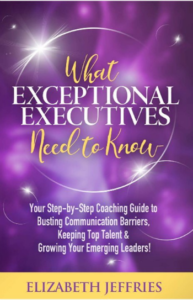I’ve been thinking about Leaders as Coaches.
Several weeks ago, I was leading the semi-annual in-person gathering of the Top 5% Mastermind Group at the Home Care CEO Forum. We were meeting in Dallas TX in the offices of one of the group members.
During our “Big Burning Issues” discussion, one of the topics that this group of Home Care CEOs dug into deeply was developing their middle management team. These leaders of top tier Home Care companies recognize that to scale their businesses, they need to develop the leadership and communication skills of their managers.
The discussion led to members sharing ideas and insights about what they have done or are doing to develop their leaders. One member has a well developed leadership development program that their COO has created over time. She described the program and offered to share some resources with the other members.
That’s one of the huge benefits of being part of a mastermind group where all the companies are in the same size range, and no one in the group competes with anyone else in the group. Members share openly.

Coaching as a Leadership Development Strategy
There are many ways that Home Care companies can provide development opportunities for managers and supervisors. You can run a series of educational programs. You can lead a Book Club. You can invite in outside speakers, and you can subscribe to online learning programs.
We’ve found that one of the most effective ways to develop your management team is through one-on-one coaching. As a leader, a key accountability is to develop the knowledge, skills, and attitudes of the managers and team member who report to you. Spending time one-on-one sharing ideas, providing information, and giving feedback are key parts of that process.
What are you doing to develop your own knowledge, skill, and willingness to be a coach to your team members?
What Exceptional Executives Need to Know about Coaching
Many of you know that my wife and business partner. Elizabeth Jeffries, coaches physician leaders in Academic Medicine. Our company, Tweed Jeffries LLC has two business practices. You are familiar with Leading Home Care … a Tweed Jeffries company, where we work with owners and CEOs of Top Tier Home Care companies who want to grow their businesses and get ready for the future.
The other part of Tweed Jeffries is called Executive Mastery … a Tweed Jeffries company. Elizabeth leads that practice, and we coach physician leaders and provide team building in several top tier schools of medicine.

In 2018, Elizabeth compiled some of her expertise and wrote a new book: What Exceptional Executives Need to Know – Your Step-by-Step Coaching Guide to Busting Communication Barriers, Keeping Top Talent, and Growing Your Emerging Leaders.
In this book, Elizabeth walks through the process she has developed over the past dozen years in coaching C-Suite leaders in hospitals and health systems, and that she has adapted to coaching physician leaders in schools of medicine.
The Five C’s of the Coach’s Crown
There are five elements of the coaching process that Elizabeth has fine-tuned in order to achieve measurable outcomes. As a leader in Home Care, you can develop each of these competencies:
- Demonstrate Care – applying the principles of Servant Leadership to put service before self.
- Have Clarity of Purpose – helping your team member be clear about what they want to accomplish from the coaching process.
- Make a Connection – it’s about HOW we connect verbally and non-verbally to master deeper and more meaningful communication.
- Convey Support – we all need someone who believes in us, inspires us, and helps us say, “Yes, I can!”
- Obtain Commitment – it’s the “I will.” It is leading people to that place of understanding, commitment, action, and accountability.
Questions: The Jewel in the Coach’s Crown
One of the key skills of any coach is asking questions. Leaders wo ask great questions are shown to be much more effective than leaders who try to tell team members what to do and how to do it.
Elizabeth learned the power of questions from her coach and mentor, Bill McGrane. Bill was a friend and colleague of ours in the National Speakers Association, and he mentored both of us. Bill was a master of using questions to process a coaching client through their core issues and help them see the solutions to their big burning issues. Elizabeth has become very adept at using questions to coach leaders, and she has really helped me develop this skill.
How are you at using questions to guide the thinking of your team members and help them develop leadership knowledge, skills, and attitudes?
For more insights, order a copy of Elizabeth’s book.




